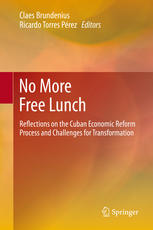

Most ebook files are in PDF format, so you can easily read them using various software such as Foxit Reader or directly on the Google Chrome browser.
Some ebook files are released by publishers in other formats such as .awz, .mobi, .epub, .fb2, etc. You may need to install specific software to read these formats on mobile/PC, such as Calibre.
Please read the tutorial at this link: https://ebookbell.com/faq
We offer FREE conversion to the popular formats you request; however, this may take some time. Therefore, right after payment, please email us, and we will try to provide the service as quickly as possible.
For some exceptional file formats or broken links (if any), please refrain from opening any disputes. Instead, email us first, and we will try to assist within a maximum of 6 hours.
EbookBell Team

5.0
18 reviewsIn September 2010, the Cuban government decided to embark on an economic reform program, unprecedented after the Revolution in 1959. This opened up opportunities for Cuban economists and scholars to participate in the development of the reform program. Thanks to grants from SSRC (Social Sciences Research Council, New York) and the Norwegian Ministry of Foreign Affairs, several researchers from the Cuban think tank CEEC (Center for Studies of the Cuban Economy, Havana) got an opportunity to visit countries that could be of interest for the reform process, notably Vietnam, but also Brazil, South Africa and Norway.
The result of these field visits and a subsequent workshop involving contributions from Cuban as well as non-Cuban scholars, this volume showcases unprecedented new insights into the process and prospects for reform along many dimensions, including foreign direct investment, import substitution, entrepreneurship and business creation, science and technology development, and fiscal policies. The resulting analysis, in a comparative perspective, provides a framework for future research as well as for business practice and policymaking.